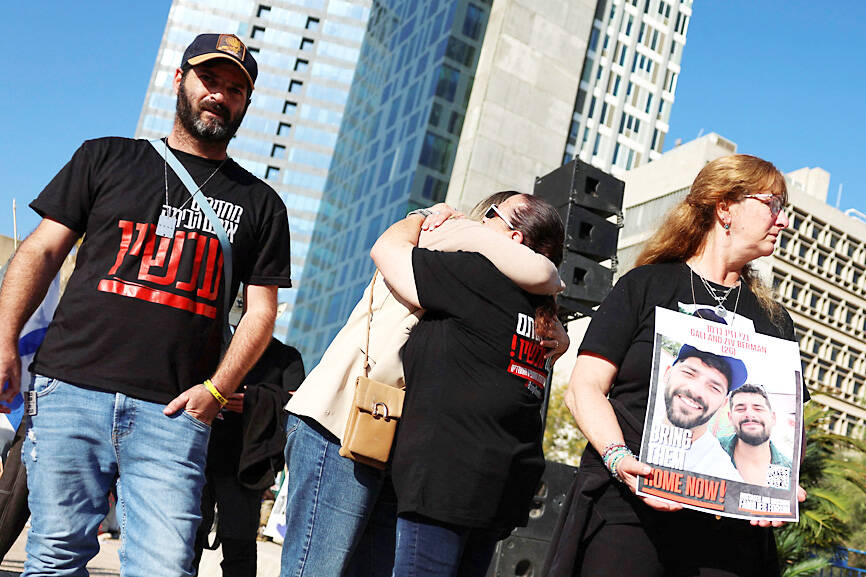Israel and Hamas yesterday extended their truce by another day as Washington’s top diplomat arrived to urge a more lasting break in the conflict.
The warring parties have agreed to a pause in fighting to allow time for the militant group to release Israeli hostages in exchange for Palestinian prisoners.
However, international pressure is mounting for a longer truce to allow medical supplies, food and fuel into the besieged Gaza Strip after fierce combat and bombardments sparked by Hamas’ bloody Oct. 7 attacks on Israel.

Photo: Reuters
“We have seen over the last week the very positive development of hostages coming home, being reunited with their families,” US Secretary of State Antony Blinken said at a meeting with Israeli President Isaac Herzog in Tel Aviv.
“It’s also enabled an increase in humanitarian assistance to go to innocent civilians in Gaza who need it desperately. So this process is producing results. It’s important, and we hope that it can continue,” Blinken said.
The latest extended truce had been due to end yesterday, but the Israeli army said the “operational pause” would continue as international mediators negotiate the release of hostages held by Hamas.
Hamas, the Muslim movement that has ruled Gaza since 2007, said there was an agreement to “extend the truce for a seventh day,” without giving further details.
It had earlier said that Israel initially refused to extend the truce after it offered to hand over seven hostages and the bodies of three.
Qatar, which has led the truce negotiations supported by Egypt and the US, confirmed the pause had been extended for a day “under the same previous conditions.”
Israel did not give a time frame.
Late Wednesday, 10 more Israeli hostages were freed under the terms of the deal, with another four Thai hostages and two Israeli-Russian women released outside the framework of the arrangement.
Video released by Hamas showed masked gunmen handing over hostages to the International Committee of the Red Cross.
Since the truce began on Friday last week, 70 Israeli hostages have been freed in return for 210 Palestinian prisoners.
SEE STORIES ON PAGE 9

The US government has signed defense cooperation agreements with Japan and the Philippines to boost the deterrence capabilities of countries in the first island chain, a report by the National Security Bureau (NSB) showed. The main countries on the first island chain include the two nations and Taiwan. The bureau is to present the report at a meeting of the legislature’s Foreign Affairs and National Defense Committee tomorrow. The US military has deployed Typhon missile systems to Japan’s Yamaguchi Prefecture and Zambales province in the Philippines during their joint military exercises. It has also installed NMESIS anti-ship systems in Japan’s Okinawa

‘WIN-WIN’: The Philippines, and central and eastern European countries are important potential drone cooperation partners, Minister of Foreign Affairs Lin Chia-lung said Minister of Foreign Affairs Lin Chia-lung (林佳龍) in an interview published yesterday confirmed that there are joint ventures between Taiwan and Poland in the drone industry. Lin made the remark in an exclusive interview with the Chinese-language Liberty Times (the Taipei Times’ sister paper). The government-backed Taiwan Excellence Drone International Business Opportunities Alliance and the Polish Chamber of Unmanned Systems on Wednesday last week signed a memorandum of understanding in Poland to develop a “non-China” supply chain for drones and work together on key technologies. Asked if Taiwan prioritized Poland among central and eastern European countries in drone collaboration, Lin

NO CONFIDENCE MOTION? The premier said that being toppled by the legislature for defending the Constitution would be a democratic badge of honor for him Premier Cho Jung-tai (卓榮泰) yesterday announced that the Cabinet would not countersign the amendments to the local revenue-sharing law passed by the Legislative Yuan last month. Cho said the decision not to countersign the amendments to the Act Governing the Allocation of Government Revenues and Expenditures (財政收支劃分法) was made in accordance with the Constitution. “The decision aims to safeguard our Constitution,” he said. The Constitution stipulates the president shall, in accordance with law, promulgate laws and issue mandates with the countersignature of the head of the Executive Yuan, or with the countersignatures of both the head of the Executive Yuan and ministers or

CABINET APPROVAL: People seeking assisted reproduction must be assessed to determine whether they would be adequate parents, the planned changes say Proposed amendments to the Assisted Reproduction Act (人工生殖法) advanced yesterday by the Executive Yuan would grant married lesbian couples and single women access to legal assisted reproductive services. The proposed revisions are “based on the fundamental principle of respecting women’s reproductive autonomy,” Cabinet spokesperson Michelle Lee (李慧芝) quoted Vice Premier Cheng Li-chiun (鄭麗君), who presided over a Cabinet meeting earlier yesterday, as saying at the briefing. The draft amendment would be submitted to the legislature for review. The Ministry of Health and Welfare, which proposed the amendments, said that experts on children’s rights, gender equality, law and medicine attended cross-disciplinary meetings, adding that